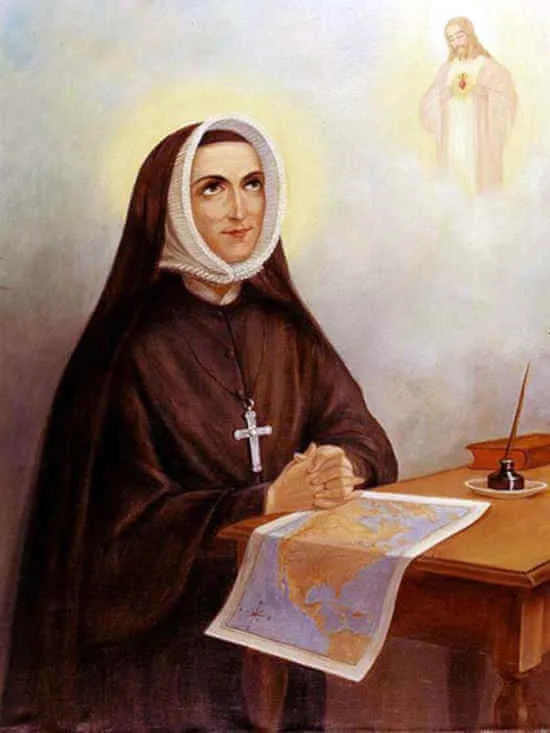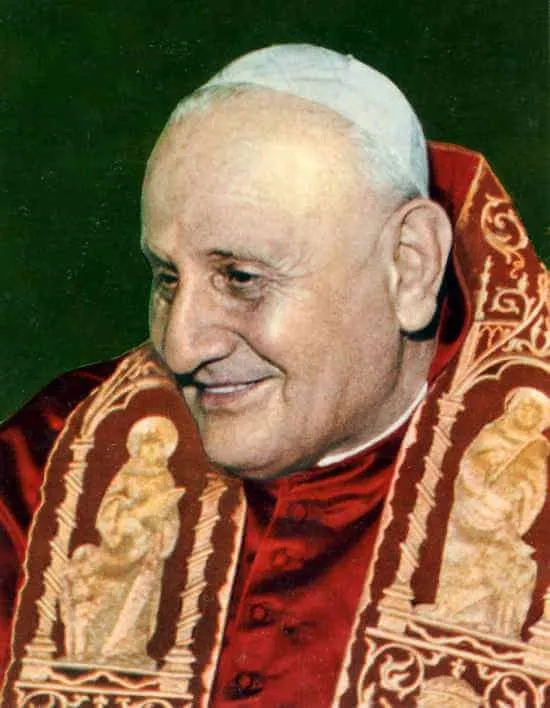1769–1852; Invoked for perseverance amid adversity and against the opposition of Church authorities; Canonized by Pope John Paul II on July 3, 1988
Rose Philippine Duchesne was born into an upper-class family in the city of Grenoble in the Kingdom of France. She was the second of eight children, seven girls and one boy. As a child, Rose’s education took place at home by private tutors. When she was eight, she was inspired by the preaching of a Jesuit missionary who spoke about the ripe new mission field of the Americas. This planted a seed within her heart that began to grow. At the age of twelve, she attended school at a convent of Visitation nuns in Grenoble. While there, she became intimately drawn to their life of contemplation within the walls of the cloister. When she informed her father that she wanted to join the community, he firmly opposed the idea and withdrew her from the school to keep her from considering it further, so she continued her education at home from tutors.
As events unfolded that would lead to the French Revolution, Rose came up with a secret plan to become a nun. In 1788, she asked her aunt to accompany her on a visit to the Visitation sisters. Once there, Rose requested permission to enter the convent. Permission was granted immediately, and Rose entered. Her aunt returned home and informed Rose’s father and the rest of her family what Rose had done. Sister Rose spent the next four years with the sisters, growing deep in prayer and being nurtured through the community and rule of life.
Once the French Revolution entered into full force, the Church became a central target. With the formation of a new National Assembly, church property was seized and clergy were forced to choose between swearing an oath of allegiance to the state or arrest and possible execution. Public worship and monastic vows were outlawed, and chaos ensued. In 1792, the monarchy was abolished, and the First French Republic was proclaimed. In that same year, the Visitation convent in Grenoble was seized by the state and turned into a prison, and the sisters were forced to disband. For the next nine years, Sister Rose lived in her family home where she attempted to continue practicing her religious vocation, along with two aunts who were also Visitation nuns.
In late 1799, Napoleon Bonaparte led a coup and disbanded the revolutionary French government, becoming the First Consul of the new French Consulate. A little more than a year later, Napoleon and Pope Pius VII signed the Concordat of 1801, which acknowledged Catholicism as the religion of the majority of the French and permitted its public practice to continue under certain state regulations. At that time, Sister Rose and some of her disbanded sisters attempted to return to their convent, but it was in disrepair due to its interim use as a military barracks and prison. Nonetheless, some of the sisters moved in with Sister Rose who was made superior. By 1804, due to the difficult living conditions at the convent, only three sisters remained with Sister Rose.
In 1804, Mother Madeleine Sophie Barat (who was canonized in 1925), the founder of a new religious order called the Society of the Sacred Heart, invited the small convent of Visitation sisters into her order. The sisters agreed, and, in November of that year, Mother Barat traveled to Grenoble to receive them. Once the Visitation convent merged with the Society of the Sacred Heart, Sister Rose made her final vows and was made superior of the new convent, known henceforth as Mother Duchesne. For the next eleven years, tensions remained high in France due to the ongoing Napoleonic Wars that lasted until the Battle of Waterloo in 1815, in which Napoleon was defeated and exiled. During this chaotic period, Mother Duchesne managed life at the convent, reopened a school, and founded new convents and schools.
In 1815, Mother Barat invited Mother Duchesne to found a new convent in Paris that would function as the novitiate for the order, as well as operate a school. In 1817, a French missionary named Father William Dubourg returned to Europe from the United States to recruit missionaries for the new territory gained by the Louisiana Purchase. Father Dubourg had been appointed Apostolic Administrator of the territory in 1812, but it lacked priests and religious. Upon his return, Pope Pius VII appointed him as Bishop of Louisiana and the Two Floridas and ordained him in Rome. He then spent the next two years traveling through Europe to recruit missionaries. In Paris, he met Mother Duchesne whose heart was immediately inflamed with a desire to assist. This desire had been in her heart since her childhood, and now it was on the verge of becoming a reality. With the approval and blessing of Mother Barat, the forty-eight-year-old Mother Duchesne and four of her sisters set sail for New Orleans in 1818 to become missionaries on the new frontier of the United States of America.
Upon their arrival, they learned that Bishop Dubourg had moved to Saint Louis out of concern for his safety, and he had not made any arrangements for the newly arrived sisters in New Orleans. The sisters then boarded a steamboat and traveled up the Mississippi to Saint Louis, settling in the nearby town of Saint Charles, where they founded their first convent (a log cabin) in the United States. It was one of the most remote parts of the country at that time and brought with it many hardships, uncertainties, and trials. But the sisters persevered, opened a free school for the poor, established their community life of prayer, and persevered in their work of building the Kingdom of God in mission territory.
Over the next thirty-four years, Mother Duchesne became a tireless founder. The next convent was founded in Florissant, which would become the mother house and novitiate for the congregation in the United States, and also served a free school. She founded new convents and schools in Saint Louis, New Orleans, and other parts of Louisiana as her order continued to grow.
Throughout her first twenty years, Mother Duchesne always had a strong desire to minister to the native tribes but was unable to do so. In 1841, her dream became a reality when she was invited to found a convent to serve the Potawatomi tribe in Sugar Creek, Kansas. Since she was seventy-one at that time, she wasn’t an ideal candidate for the job and further was unable to learn the Potawatomi language. Nonetheless, the Jesuits who were leading the expedition insisted she come for prayer support, which she did to the greatest degree. In fact, she prayed so long and so often that the natives gave her the affectionate name “Quah-kah-ka-num-ad,” which means, “Woman-who-prays-always.” One story relates that the children were so impressed by her prayerfulness that they would often place pebbles on the hem of her garment as she knelt in prayer at night and then return the next morning to see if the pebbles were still in place, and they usually were, giving a powerful witness to the mystical nature of her all-night vigils.
After about a year in Sugar Creek with the Potawatomi, Mother Duchesne’s health took a turn for the worse, compelling her to return to the mother house near Saint Louis to rest and be cared for. Just as she was the “woman who prays always” while among the Potawatomi, so she spent the final decade of her life in continuous prayer, uniting her sufferings to Christ, and spiritually mentoring the younger sisters as the community grew.
This courageous woman gave up all that she knew and all that she had, except for her religious habit and the companionship of a few sisters, so that she could bring the Gospel to the frontier of the United States as the people slowly moved West. Her deepest desire to share the faith with the natives became a reality because of her perseverance and reliance on prayer. As we honor Saint Rose today, we honor her as a true spiritual mother who saw everyone as her children whom she needed to nurture in love by instilling faith and hope. In imitation of her, allow the desire to be a missionary to be enkindled within your heart. Though you might not be called to travel the seas to share the faith, you will certainly be called to share the love of Christ in accord with your own vocation. Submit yourself fully to that mission, and God will use you, as He used Mother Duchesne, for glorious things.
Source: https://mycatholic.life/saints/saints-of-the-liturgical-year/november-18—saint-rose-philippine-duchesne/








